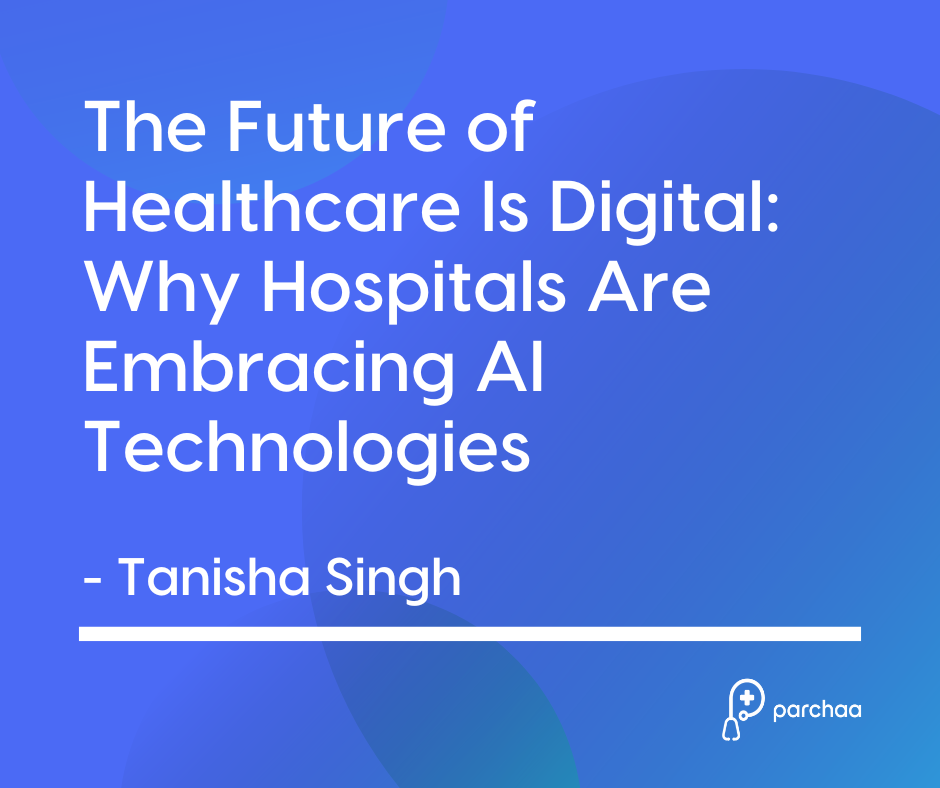Contact Us
If you have any questions, feedback, or need assistance, our dedicated support team is here to help.

The Urgent Need for Digital Transformation in Healthcare
Healthcare systems worldwide are under immense pressure due to rising patient volumes, increasing chronic diseases, workforce shortages, and escalating costs. These challenges are especially pronounced in countries like India where healthcare infrastructure often struggles to meet demand efficiently. The COVID-19 pandemic further exposed vulnerabilities in hospital systems, intensifying calls for modernization.
Digital transformation powered by artificial intelligence (AI) is speeding up healthcare innovation, especially in hospitals. AI technologies enhance diagnostics, optimize workflows, improve patient experience, and reduce clinician burnout. As hospitals face an urgent need to improve treatment outcomes while controlling operational costs, embracing AI has shifted from optional to essential.
How AI Technologies Are Reshaping Hospital Care
Enhanced Diagnostics and Clinical Decision Support
AI algorithms can analyze vast datasets rapidly, helping identify disease patterns and diagnostic markers that might be missed by the human eye. For example, AI-powered imaging tools detect abnormalities in scans with remarkable accuracy, aiding early diagnosis of cancers and cardiovascular diseases.
Clinical decision support systems (CDSS) provide real-time guidance to doctors by integrating patient records, research data, and clinical protocols. This reduces errors and helps personalize treatments, leading to better patient outcomes.
Streamlining Hospital Operations and Reducing Burnout
Hospitals often suffer from administrative overload. AI-driven automation handles routine tasks like patient scheduling, billing, and data entry, freeing clinical staff to focus on direct patient care. This not only improves hospital efficiency but also mitigates burnout among physicians and nurses.
For instance, AI-powered digital workforce tools have reduced errors in patient wait lists and appointment bookings, speeding up scheduling processes and improving patient experience.
Remote Patient Monitoring and Telemedicine Integration
AI-enabled remote monitoring devices track patients’ vital signs and health data in real time, allowing earlier interventions if conditions worsen. Coupled with telemedicine platforms, hospitals can extend care beyond physical premises, reaching patients in rural or underserved regions.
Data-Driven Resource Management
AI predicts patient admission trends, optimizes resource allocation, and manages supply chains efficiently. These predictive insights help hospitals reduce waste, control costs, and maintain readiness for emergencies.
Challenges and Ethical Considerations
Despite benefits, AI integration in hospitals poses challenges:
- Data Privacy and Security: Protecting sensitive health information from breaches is paramount.
- Algorithmic Bias: Ensuring AI models are trained on diverse data prevents disparities in care.
- Transparency and Explainability: Hospitals must trust AI decisions and explain them to patients clearly.
- Regulatory Compliance: Adhering to standards like HIPAA and India’s ABDM is necessary.
- Workforce Adaptation: Training staff to work alongside AI and addressing job displacement fears.
Parchaa’s Unique Role in AI-Powered Hospital Transformation
Parchaa offers a comprehensive AI-driven healthcare platform designed for hospitals in India and similar markets. Key differentiators include:
- ABDM Compliance and Interoperability: Seamlessly integrates with national digital health frameworks for secure, standardized data exchange.
- 27 Modular AI Solutions: From symptom checking and clinical decision support to automated record-keeping and queue management, Parchaa addresses key hospital pain points comprehensively.
- User-Centric Design: Intuitive interfaces for clinical staff reduce learning curves and support adoption.
- Data Privacy Focus: Robust encryption, consent protocols, and role-based access control ensure patient confidentiality.
- Sustainability and Efficiency: Parchaa’s digital systems minimize paper use and optimize workflows, promoting greener healthcare delivery.
Real-World Impact and User Insights
Hospitals using Parchaa’s AI solutions have reported significant reductions in patient wait times, improved diagnostic accuracy, enhanced documentation quality, and decreased administrative burden on staff. For example, automated scheduling and digital queue management have shortened outpatient waiting periods by up to 40%, improving patient satisfaction and clinician workflow.
Healthcare leaders emphasize that Parchaa’s tools empower them to maintain high standards despite rising patient loads and complex regulatory environments.
The Future Outlook: Embracing AI for Sustainable Hospital Care
AI will continue to evolve, with innovations in generative AI, agentic systems, and integrated patient data ecosystems further transforming hospital operations and clinical care. The challenge will be balancing technology adoption with ethical oversight and human-centered care.
Hospitals that invest in flexible, compliant, and patient-centric AI platforms will be best positioned to enhance care quality, operational efficiency, and resilience in an increasingly complex healthcare landscape.
Conclusion: Taking the Leap Toward Digital Healthcare
The future of healthcare is digital, and hospitals are at the forefront of this transformation. AI technologies not only improve diagnostics, care delivery, and efficiency but also empower healthcare professionals and patients alike. Hospitals and health systems should partner with trusted AI platforms like Parchaa, which combine cutting-edge technology, regulatory compliance, and user-centered design. This collaboration will unlock scalable, sustainable healthcare transformation tailored to evolving patient and provider needs.



